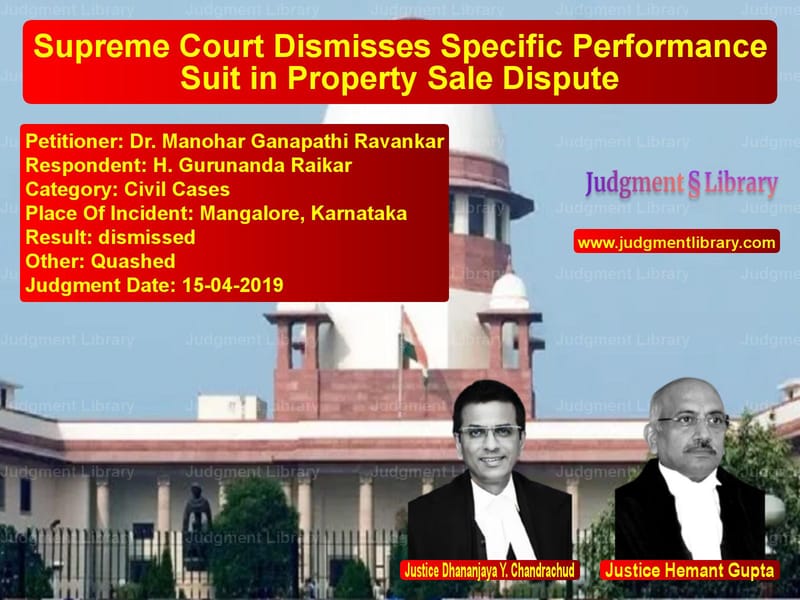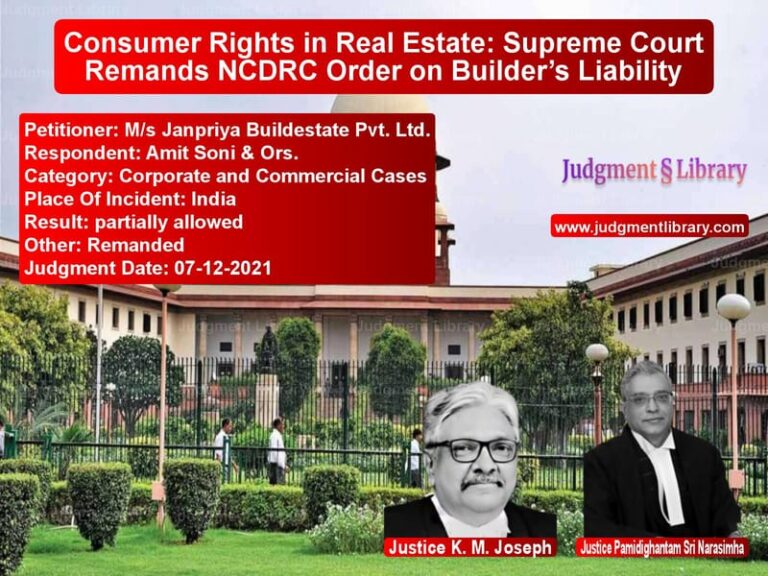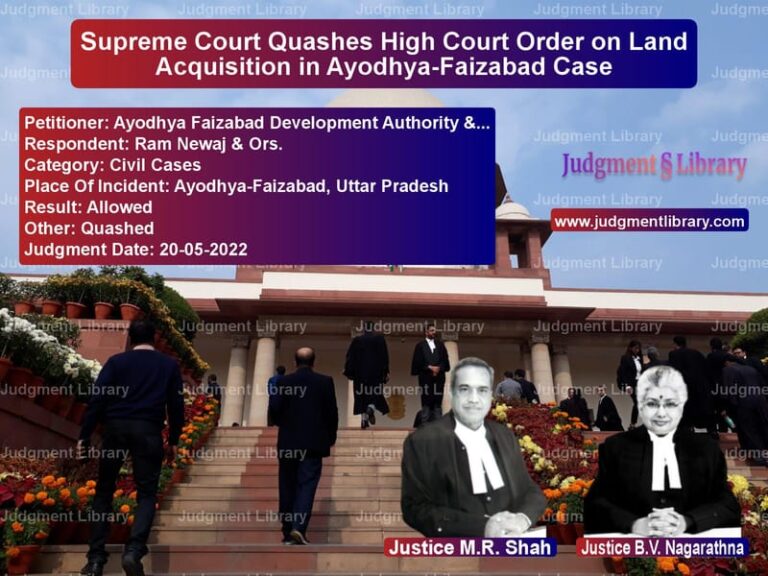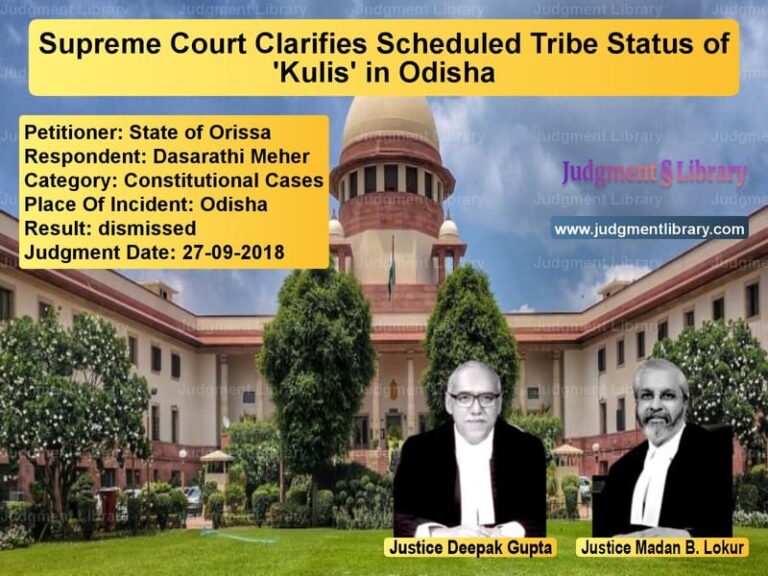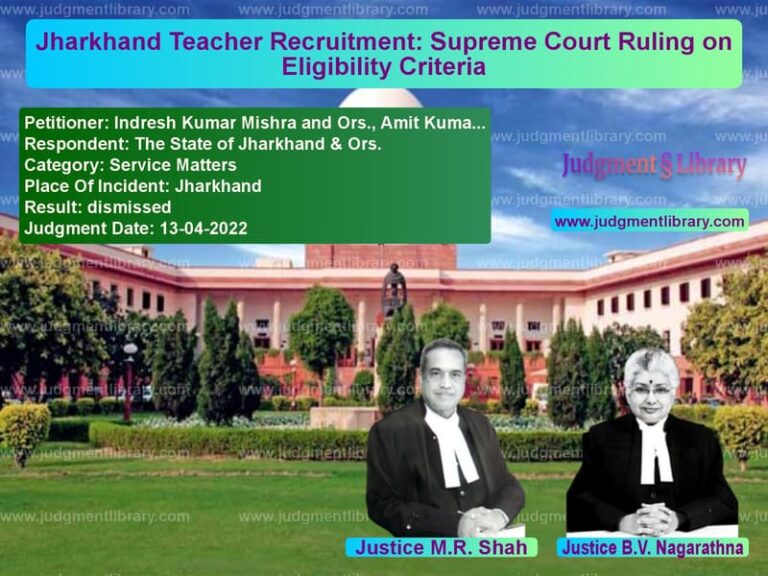Supreme Court Dismisses Specific Performance Suit in Property Sale Dispute
The Supreme Court of India, in its judgment dated April 15, 2019, ruled on a property sale dispute concerning the enforcement of a sale agreement. The case, Dr. Manohar Ganapathi Ravankar vs. H. Gurunanda Raikar, involved the alleged non-performance of a sale agreement and the claim for specific performance. The Supreme Court upheld the Karnataka High Court’s ruling that the plaintiff had failed to prove his readiness and willingness to complete the transaction. However, the Court set aside the High Court’s order awarding a refund of Rs.6,75,000, as there was no credible evidence of such a payment.
Background of the Case
The dispute revolved around an agreement dated July 21, 2006, between the appellant, Dr. Manohar Ganapathi Ravankar, and the respondent, H. Gurunanda Raikar, for the sale of a 7.25-cent property in Kadri Village, Mangalore. The agreed sale consideration was Rs.30,00,000, with an initial advance payment of Rs.26,000. The agreement stipulated that the sale deed would be executed within six months, extendable by mutual consent.
However, complications arose when the property was found to be entangled in a legal dispute (O.S. No. 196/2005) involving the respondent’s brother. The appellant sent a legal notice on December 25, 2006, claiming readiness to pay the balance amount and execute the sale deed. When no response was received, he filed a suit (O.S. No. 350/2007) for specific performance, alleging that an additional Rs.6,75,000 had been paid in cash.
Arguments by the Appellant
- The appellant contended that he had fulfilled all conditions of the agreement and was ready to complete the transaction.
- He claimed that the respondent had deliberately delayed execution of the sale deed.
- He argued that he had made an additional payment of Rs.6,75,000 and had even taken possession of the property’s title documents.
- His legal notice of December 25, 2006, was cited as proof of his intent to complete the transaction.
Arguments by the Respondent
- The respondent contended that the appellant had failed to prove his financial readiness to complete the sale.
- He denied receiving the additional amount of Rs.6,75,000 and challenged the appellant’s credibility.
- He argued that the agreement itself allowed an extension, which was never mutually agreed upon.
- He pointed out that the appellant had filed multiple legal proceedings over the same property, indicating a lack of genuine intent.
Trial Court’s Decision
- The trial court ruled in favor of the appellant, granting a decree for specific performance.
- The respondent was ordered to execute the sale deed upon receipt of the balance amount.
High Court’s Reversal
- The Karnataka High Court overturned the trial court’s ruling, holding that the appellant had failed to prove readiness and willingness to perform his obligations.
- The Court observed that there was no credible evidence of payment of Rs.6,75,000.
- However, it granted the appellant a refund of Rs.7,01,000, including the alleged additional payment.
Supreme Court’s Observations
- The Supreme Court upheld the High Court’s ruling that the appellant had not proved his readiness to execute the sale deed.
- The Court found that the appellant’s claim of paying Rs.6,75,000 in cash was unsupported by documentary evidence.
- It noted that the only recorded payment was the advance of Rs.26,000, which was made by cheque.
- The Court stated that “if an earnest money payment of Rs.26,000 was made by cheque, then a claim of Rs.6,75,000 being paid in cash without any proof is beyond comprehension.”
Final Judgment
- The Supreme Court dismissed the appellant’s claim for specific performance.
- It also set aside the High Court’s award of Rs.7,01,000 to the appellant.
- The respondent was ordered to refund only the initial advance payment of Rs.26,000, with 9% simple interest per annum.
Legal Implications
- This judgment reinforces that a plaintiff seeking specific performance must demonstrate continuous readiness and willingness to execute the sale.
- It emphasizes that oral claims of cash payments without documentary proof cannot be relied upon in legal disputes.
- The ruling serves as a cautionary precedent for property buyers to maintain proper records of financial transactions.
- The decision also clarifies that courts should not award amounts based on mere presumptions in contract disputes.
Conclusion
The Supreme Court’s decision in this case highlights the importance of documentary evidence in property transactions. The judgment underscores that specific performance is an equitable relief that requires the plaintiff to prove continuous willingness to perform the contract. By rejecting unsubstantiated monetary claims, the Court has set a precedent that promotes transparency in property dealings and discourages speculative litigation.
Petitioner Name: Dr. Manohar Ganapathi Ravankar.Respondent Name: H. Gurunanda Raikar.Judgment By: Justice Dhananjaya Y. Chandrachud, Justice Hemant Gupta.Place Of Incident: Mangalore, Karnataka.Judgment Date: 15-04-2019.
Don’t miss out on the full details! Download the complete judgment in PDF format below and gain valuable insights instantly!
Download Judgment: Dr. Manohar Ganapath vs H. Gurunanda Raikar Supreme Court of India Judgment Dated 15-04-2019.pdf
Direct Downlaod Judgment: Direct downlaod this Judgment
See all petitions in Contract Disputes
See all petitions in Property Disputes
See all petitions in Specific Performance
See all petitions in Judgment by Dhananjaya Y Chandrachud
See all petitions in Judgment by Hemant Gupta
See all petitions in dismissed
See all petitions in Quashed
See all petitions in supreme court of India judgments April 2019
See all petitions in 2019 judgments
See all posts in Civil Cases Category
See all allowed petitions in Civil Cases Category
See all Dismissed petitions in Civil Cases Category
See all partially allowed petitions in Civil Cases Category

